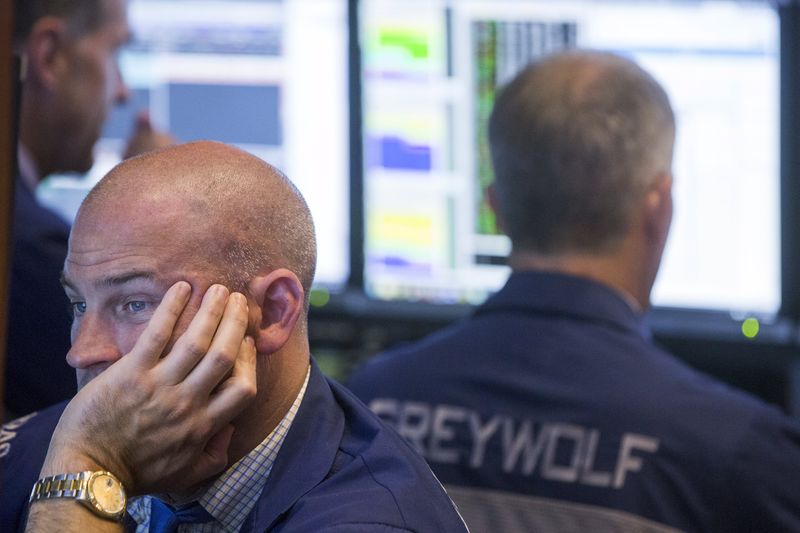* European shares slump at open
* Yen, Treasury notes in demand
* Many Asian markets closed for new year holiday
* Volatility surges
By Ritvik Carvalho
LONDON, Jan 27 (Reuters) - World shares slipped to their lowest in two weeks on Monday as worries grew about the economic impact of China's spreading coronavirus, with demand spiking for safe-haven assets such as Japanese yen and Treasury notes.
The death toll from the coronavirus outbreak in China rose to 81 and the virus spread to more than 10 countries, including France, Japan and the United States. Some health experts questioned whether China can contain the epidemic. midday in London, MSCI's All-Country World Index .MIWD00000PUS , which tracks shares across 47 countries, was down 0.6% to its lowest since Jan. 9.
In Europe, stock markets slumped at the start of trading, tracking their counterparts in Asia. The pan-European STOXX 600 index fell 2% to its lowest level since Jan. 6, and the Euro Stoxx 50 volatility index .V2TX jumped to its highest level since December. .EU
"The coronavirus is an economic and financial shock. The extent of that shock still needs to be assessed, but it could provide the spark for an arguably long-overdue adjustment in the capital markets," Marc Chandler, chief market strategist at Bannockburn Securities, told clients.
In Asia, Japan's Nikkei average .N225 slid 2.0%, the biggest one-day fall in five months. A Tokyo-listed China proxy, ChinaAMC CSI 300 index ETF 1575.T , fell 2.2%. Many markets in Asia were closed for the Lunar New Year holiday.
U.S. S&P 500 mini futures ESc1 were last down 1.36%, suggesting an open in the red on Wall Street later. The VIX .VIX volatility index, also known as Wall Street's "fear gauge", hit its highest levels since October.
OIL SLIDES
The ability of the coronavirus to spread is getting stronger and infections could continue to rise, China's National Health Commission said on Sunday. More than 2,800 people globally have been infected. announced it will extend the week-long new year holiday by three days to Feb. 2 and schools will return from their break later than usual. Chinese-ruled Hong Kong said it would ban entry to people who have visited Hubei province in the past 14 days. the continued spread of the virus is concerning, we were expecting that the outbreak could worsen before being brought under control," UBS strategists wrote in a research note, adding that they expected impact on the region's economy and risk assets to be short-lived.
"Sentiment may remain depressed in the near term, especially for those sectors most impacted, however we retain a positive outlook for emerging market stocks, including a preference for China equities within our Asia portfolios."
MSCI's broadest index of Asia-Pacific shares outside Japan .MIAPJ0000PUS was off 0.45%, although markets in China, Hong Kong, Taiwan, South Korea, Singapore and Australia were closed on Monday.
All three major Wall Street indexes closed sharply lower on Friday, with the S&P 500 seeing its biggest one-day percentage drop in over three months. S&P 500 .SPX lost 0.9%, the Dow Jones Industrial Average .DJI 0.6% and the Nasdaq Composite .IXIC 0.9%. The U.S Centers for Disease Control and Prevention has confirmed five case of the virus on U.S. soil. Treasury prices advanced, pushing down yields. The benchmark 10-year note's US10YT=RR yield fell to a three-and-half-month trough of 1.6030%. It last traded at 1.6321%.
Elsewhere in bonds, the Italian 10-year yield fell to a three-month low Monday after right-wing leader Matteo Salvini failed in his bid to overturn decades of leftist rule in the northern region of Emilia-Romagna on Sunday, bringing some relief to the government. GVD/EUR
In the currency market, the Japanese yen strengthened as much as 0.5% to 108.73 yen per dollar JPY= , a two-and-a-half-week high.
The euro EUR= last traded unchanged to the dollar.
China's yuan tumbled to a 2020 low, and commodity-linked currencies such as the Australian dollar fell, as growing fears about the spread of a coronavirus from China pushed investors into safe assets. FRX/
The coronavirus outbreak also pressured oil and other commodity prices.
U.S. West Texas Intermediate crude futures CLc1 plummeted 2.69% to a three-and-a-half-month low of $52.13. Brent LCOc1 shed more than 3% to a three-month low of $58.50 per barrel. O/R
Spot gold XAU= rose as much as 1.0% to $1,585.80 per ounce, the highest level since Jan. 8, as the coronavirus outbreak pushed up demand for the safe-haven metal. GOL
https://tmsnrt.rs/2Rgj92F
^^^^^^^^^^^^^^^^^^^^^^^^^^^^^^^^^^^^^^^^^^^^^^^^^^^^^^^^^^^>
